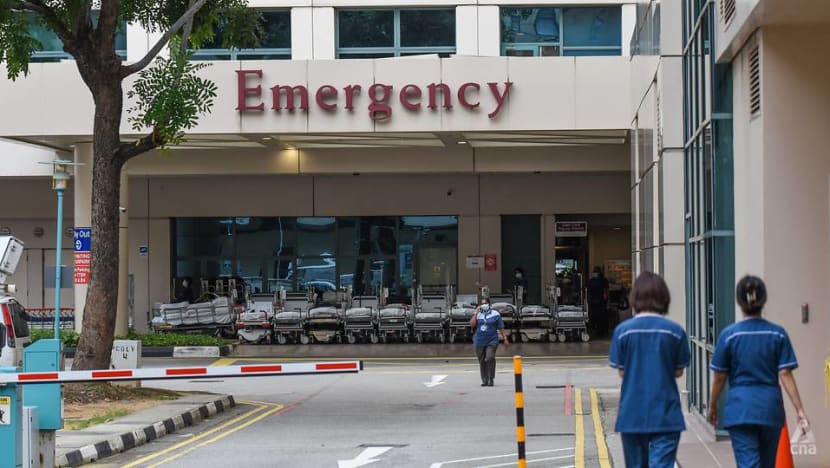Many TTSH staff members face discrimination after COVID-19 cluster emerged: Union

Hospital staff members walking towards Tan Tock Seng Hospital's Accident and Emergency (A&E) department on Apr 30, 2021. (Photo: Calvin Oh)
SINGAPORE: Discrimination against healthcare workers has increased since the COVID-19 outbreak, with many Tan Tock Seng Hospital (TTSH) staff members encountering problems when the hospital emerged as a cluster, said the Healthcare Services Employees' Union (HSEU).
The hospital is an active COVID-19 cluster, with 46 cases linked to it as of Sunday (May 16).
In response to queries from CNA, union president K Thanaletchimi said there have been “a handful of cases” involving members.
“In fact, we were told many TTSH staff encountered similar problems when TTSH emerged as a COVID-19 cluster,” she added.
The union is “constantly keeping in touch” with its TTSH branch office, and received “some anecdotal reports” from healthcare workers in the early days of the hospital cluster.
For example, TTSH staff members reported that when they are in uniform on public transport, passengers would move away from them or wear their masks tighter against their faces, said Ms Thanaletchimi.
“While it is understandable that the pandemic has taken a toll on everyone, this does not mean that we can be rude and inconsiderate towards others," she said.
“It is a testament of their dedication that despite the high level of stress and occasional demoralising incidences, they still carry on performing their duties without prejudice,” Ms Thanaletchimi said.
“We strongly believe that all workers should be treated with dignity and respect, this includes our healthcare workers, who have worked tirelessly to keep Singapore safe against the backdrop of COVID-19. We do not condone verbal and physical abuse, or any discrimination against our healthcare workers,” she said.
Despite seeing an increase in the number of reports of TTSH employees being shunned in public, the union noted that there are others who have supported healthcare workers with kind words and gestures.
READ: Healthcare workers being asked to move out, shunned in public a ‘very worrisome trend’: Gan Kim Yong
ANXIETY AROUND HEALTHCARE WORKERS
The discrimination against healthcare workers from TTSH and other hospitals was raised in Parliament earlier this month by Member of Parliament Tan Wu Meng (PAP-Jurong).
Dr Tan cited several cases of nurses who have been told by their landlords to move out at short notice, as well as a man who works at TTSH who has had to move out of the house to keep his wife and her fellow healthcare workers at another hospital safe from COVID-19 transmission between hospitals.
“What is being done to help affected TTSH workers, nurses who can't find a place to stay, healthcare workers who can't find a Grab or taxi to bring them to the hospital or to take them home after a shift, families who have been separated by necessary COVID-19 precautions who need help with childcare, help with getting the kids to continue in school?” he had asked.
In Parliament, then-Minister for Health Gan Kim Yong said in his reply that it was a “worrisome trend” to see a “minority” of Singaporeans taking steps to protect themselves at the expense of healthcare workers’ well-being.
“Some of them have been asked to move out of their homes by their landlords, some of their co-workers are shunning them. I think these are wrong,” said Mr Gan in Parliament.
“We are struggling because on one hand, we know this is wrong, we should not condone such actions. On the other hand, we are concerned about the well-being of the healthcare workers and do need to find ways to help them and support them.”
Speaking on the phone with CNA, Dr Tan said that according to feedback from residents and fellow healthcare workers, this treatment may arise because the public may not be aware of the various precautions being taken to keep healthcare workers safe.
“I think the anxiety seems to be surrounding TTSH because TTSH has been in the news that there is a significant cluster there,” he added.
READ: A timeline of the Tan Tock Seng Hospital COVID-19 cluster
LANDLORDS EVICTING HEALTHCARE WORKERS
Addressing the issue of TTSH healthcare workers being asked by landlords to move out from their homes at short notice, Dr Tan said “the worry is increasing” among healthcare workers because they are hearing of instances where a colleague has been asked to leave.
“Again, it’s a difficult situation because sometimes the healthcare worker may just be renting one room within a flat. And if the landlord staying there … is (an) elderly and in some cases ... has got medical conditions and can’t be vaccinated, the landlord may also be fearful.”
ERA district division director Benjamin Poh told CNA that if the landlord is renting out a whole unit to the healthcare worker, “there shouldn’t be any reason” for the landlords to terminate the agreement.
“Number one, the landlord would not be in contact with the tenant. Number two, they have a proper lease, so you can’t terminate (it) unless there is a valid reason,” he added.
According to Mr Poh, tenancy agreements for whole units are usually based on a lengthy template vetted by the Council of Estate Agencies (CEA) and lawyers.
“Certainly under the tenancy agreement, the only reason why you can terminate a lease is number one, you don’t pay rent. That is very fair. And number two, the house is damaged by the tenant. So it is only these two reasons, there is no other reason why you should terminate a lease.”
Working in a hospital, being in contact with COVID-19 patients, or even getting infected with the virus are not valid reasons to evict a tenant, he added.
“If the person has COVID, he or she will be in the hospital. (Otherwise) it’s just a stay-home notice, or they are staff working at a high-risk zone. That is not a valid reason because from the first day you rent to them, you already know they are working in Tan Tock Seng."
Mr Poh added that there are other tenants who work in other high-risk industries like the aviation sector who also have to serve stay-home notices and it would be unfair to single out TTSH employees.
However, grey areas may arise when a tenant is renting just one room from a landlord who is residing there, he added.
“The grey area of room rental is that it is not very well-managed or regulated by the Government or even the (Housing and Development Board) HDB. HDB only requests the landlord submits the names for registration on HDB website, to let them know who is staying in their house,” said Mr Poh.
“There isn’t even a standard room rental tenancy agreement across the whole market provided by CEA.”
Adding that tenancy agreements for room rental tend to be less in-depth and shorter than agreements for the rental of whole units, he also noted that there are many informal online groups on social media platforms that help landlords and tenants find each other.
“For such cases, it is even more not regulated. We do not even know how the tenancy agreement is written out. If that’s the case, I would not be shocked that the tenant is asked to leave within the next few days, like to pack up and go.
“The owner has the legal rights to the house. If they deem this tenant to be a trespasser because there isn’t a proper documentation done, they can just call the police.”
While healthcare workers who think they may have been unfairly evicted can seek legal assistance, the stamp duty of a tenancy agreement has to be paid for the agreement to be recognised in court, Mr Poh noted.
For many room rentals agreements made directly between landlords and tenants, they try to avoid that stage because it costs money, he added.
“Even if there is a termination clause, there isn’t a middleman to enforce and witness that the termination clause is valid. Everything is a personal agreement between two parties with no witnesses. And everything is verbal or everything is just by a contract. Even the police can’t enforce.
“What can be done is, you (can) sue the landlord. But would you sue a landlord for such a small case? I don’t think so.”
READ: ‘Several important lessons’ from Tan Tock Seng Hospital COVID-19 cluster, says Gan Kim Yong
HELP FOR HEALTHCARE WORKERS ON THE WAY
The Ministry of Health (MOH) and the COVID-19 multi-ministry task force have started negotiations with hotels and other places to provide alternative accommodation to affected healthcare workers, said Mr Gan earlier in May.
“Let me say that this should not be an excuse to the landlords to kick them out on the basis, since now there is an alternative accommodation, why not just move over to the hotels rather than staying on in the flat," he said.
“I think it is still our preference to encourage our landlords to understand the situation, to play their part to support our healthcare workers, and the work that we do. And I also want Singaporeans to also show their support to these healthcare workers, because they are putting themselves in harm's way in order to protect us. So let us work together to protect them.”
Taxi and private-hire car companies have also implemented measures to support healthcare workers.
ComfortDelGro has monitored the supply of taxis to hospitals amid the recent increase in community cases, and has not seen a “significant drop” for both street hire and call bookings to and from these areas, said the group’s chief branding and communications officer Tammy Tan.
“In a recent check at TTSH, we observed that there was no shortage of taxis at the taxi stand,” she added.
ComfortDelGro is “always encouraging” its drivers to head to areas of high demand, including hospitals, said Ms Tan.
“As a matter of principle, we do not discriminate against any passenger and do not condone any such acts by our drivers too,” she added.
“Our cabbies also know that they are fully supported by the company should they experience any COVID-related symptoms as a result of their work.
Gojek has partnered with TTSH to distribute S$10 ride vouchers to hospital employees, said general manager Lien Choong Luen.
“Thousands of Gojek driver-partners have also virtually pledged their commitment to fulfill trips originating from hospitals and ensure that healthcare workers can continue to travel to and from their workplace safely and comfortably,” he added.
This is part of GoHeroes - Gojek’s ongoing initiative launched last year to support healthcare workers.
“Additionally, we have increased our educational outreach to driver-partners to remind them that trips may include hospital pick-ups and drivers must implement precautions to ensure a safe ride environment, especially if they fetch passengers from hospitals,” said Mr Lien.
“Precautions include winding down their vehicles’ windows while ferrying such passengers, and cleaning and disinfecting their vehicles after every completed trip, so as to improve ventilation and sanitation in their vehicles.”
Grab plans to conduct another recruitment drive to bring on more volunteer driver-partners for its GrabCare service, said a company spokesperson. The dedicated on-demand service was launched last year for healthcare workers travelling to and from hospitals.
“We note the increase in community cases, and hope to be able to support our healthcare workers further,” the spokesperson added.
Grab will also be providing GrabFood promo codes to all doctors and nurses serving stay-home notices, said the spokesperson.
BOOKMARK THIS: Our comprehensive coverage of the COVID-19 pandemic and its developments
Download our app or subscribe to our Telegram channel for the latest updates on the coronavirus outbreak: https://cna.asia/telegram












